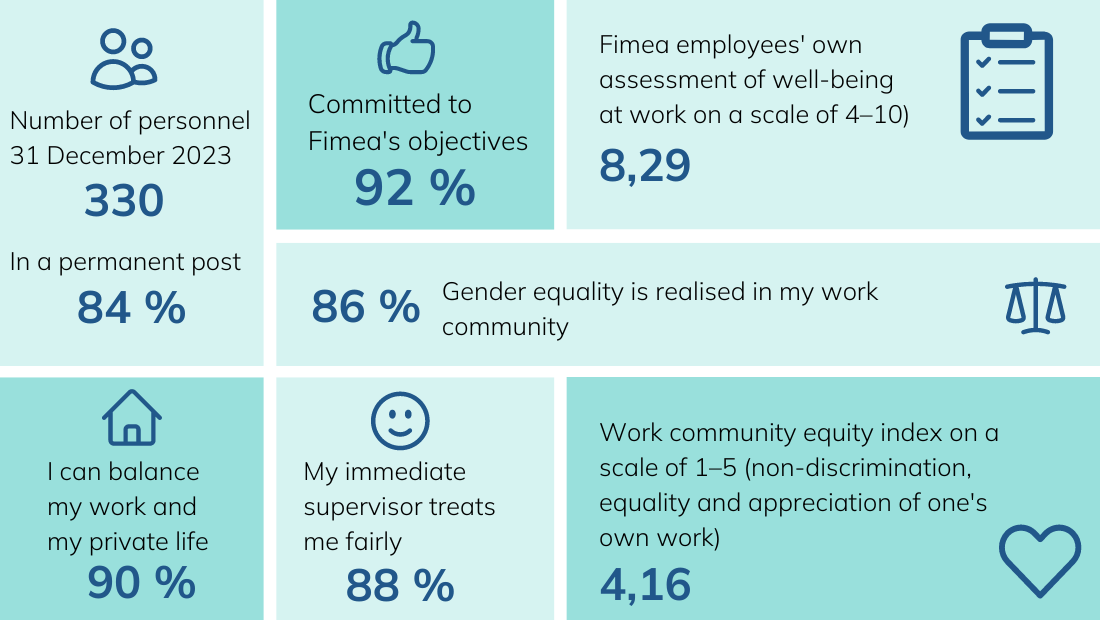Fimea employees’ job satisfaction (1–5) in 2018-2023 in an accessible format (pdf).
Fimea’s footprint – social, ecological and economic responsibility

In responsibility work, footprint refers to the direct impact that the organisation’s actions have on the environment, people and society. Fimea aims to reduce the negative social, ecological, and economic impacts caused by its actions.
Social responsibility
Developing interaction skills and dialogue. In recent years, Fimea has invested in developing its personnel's interaction and dialogue skills. The aim is to ensure that Fimea is as good and safe a workplace as possible. Fimea's strategic objective "Service-oriented expertise" also emphasises helping colleagues and sharing expertise in the work community.
A coaching approach. In 2023, Fimea started training for its entire personnel that focused on a coaching approach. The aim was to learn to apply a coaching approach to work in everyday interactive situations, to increase cooperation across unit boundaries and to strengthen a sense of community that is locality-specific in nature. Coaching will continue in 2024.
Supporting personnel resources. The increased workload and increase in remote work emphasised the importance of taking care of personnel resources. Fimea organised supervisor forums at which the management of work ability and bringing up challenging situations were discussed. Workplace surveys and health examinations were continued to promote the health of workers. The 2023 Government personnel survey showed a slight increase in Fimea employees’ job satisfaction from the previous year.
| Year Sort the table ascending by the column | 2018 Sort the table ascending by the column | 2019 Sort the table ascending by the column | 2020 Sort the table ascending by the column | 2021 Sort the table ascending by the column | 2022 Sort the table ascending by the column | 2023 Sort the table ascending by the column |
|---|---|---|---|---|---|---|
| Job satisfaction | 3,67 | 3,71 | 3,71 | 3,75 | 3,76 | 3,79 |
| Year Sort the table ascending by the column | 2018 Sort the table ascending by the column | 2019 Sort the table ascending by the column | 2020 Sort the table ascending by the column | 2021 Sort the table ascending by the column | 2022 Sort the table ascending by the column | 2023 Sort the table ascending by the column |
|---|---|---|---|---|---|---|
| Traineeships | 12 | 12 | 7 | 14 | 11 | 16 |
It is important for Fimea to enable multilocation work and employment in several localities. Multiple locations offer the opportunity to select the applicant who best suits the position, regardless of place of residence. Fimea is also happy to offer paid traineeships for future experts at the government agency. In 2023, several IT development projects were underway at Fimea. One of Fimea's prerequisites for competitive tendering for projects was that a junior programmer always participates in them, who is only just starting their career.

Ecological sustainability and financial responsibility
Fimea has extensive rights for remote work that reduce, for example, emissions related to commuting and the energy consumption of office buildings.
Remote inspections are also a permanent part of Fimea's toolbox alongside on-site inspections. As is the case in inspection activities in general, the selection of remote inspection sites is based on risk assessment, and there are clear guidelines on the selection of the inspection method, taking into account the objectives of the inspection.
Fimea pays attention to the environmental impacts of travel and observes the Government's travel strategy. The strategy emphasises environmental sustainability by reducing the amount of travel, favouring environmentally friendly travel methods and including emission impacts as part of the assessment of total travel costs.
Fimea continued the development and digitalisation of service processes, implementing numerous development projects in connection with which the systems were reformed and e-services were developed. For example, the reporting of shortages and adverse effects of medicinal products was reformed, and a new e-service for the registration of operators and equipment for medical devices was also introduced. The aim of several IT development projects has been to reduce the simultaneous use of manual work and several parallel systems and thus to increase job satisfaction. The electrification of processes is also reflected in the fact that paper mail has decreased by 70% since 2022, and the use of copy paper has also decreased. It is estimated that approximately 90 per cent of Fimea's services are within the scope of digitalised services, and a maximum of 10 per cent are implemented through traditional paper mail or telephone services.
The cloud transition, launched in 2022, progressed as planned and in line with the cloud policies for the public sector by transferring existing systems to the public cloud and developing new cloud-based solutions. Fimea transferred 16 IT services to the cloud in 2023. Compared to traditional data centres, cloud services improve the efficiency, flexibility and sustainability of Fimea's IT services:
- Eco-friendliness. Cloud services enable the more efficient use of server capacity utilised by Fimea, which reduces energy consumption and Fimea's carbon footprint.
- Information security. Cloud service providers invest in security, and the infrastructure is better protected than traditional data centres.
- Savings. Cloud services are cost-effective: Fimea only pays for their use and does not need to maintain additional capacity or its own infrastructure. The costs of development can also be reduced by means of competition, as more cloud service developers are available on the market.
- Monitoring capacity. Cloud services provide more detailed monitoring of capacity utilisation. In addition, service providers provide recommendations on how Fimea can use cloud services more ecologically.
Fimea aims to reduce the negative environmental impact of premises by implementing the Government's premises strategy. For example, the use of premises has been made more efficient by moving to premises shared by central government and administered by Senate Properties to the extent possible. In 2023, Fimea operated in shared facilities in Kuopio and Tampere (Senate Properties' corporate social responsibility report: Social Responsibility, in Finnish). In addition, Senate Properties launched a joint planning project for the work environment of the Turku Administrative Office Building, in which Fimea is involved. A joint work environment project is also underway in Oulu. Fimea has participated in Senate Properties' Energy Saving Programme (Astetta alemmas campaign) at all its sites.
Fimea's funding mainly comprises customer fees paid by pharmaceutical sector operators. In 2023, marketing authorisations for medicinal products, licence and audit fees for pharmaceutical operators and quality control fees under the separate statute accounted for approximately 87% of the agency's total funding. The remaining 10% is activities financed from the state budget, as well as 3% id project funding from the EU and the Ministry. The financial statements and annual report for 2023 (www.julkari.fi, pdf, in Finnish) provide a comprehensive picture of Fimea’s finances.
Public procurements within the framework of the Act on Public Procurement and Concession Contracts and Fimea's procurement rules are part of the financial, ecological and social sustainability. In its procurements, Fimea chiefly makes use of the framework arrangements put out to tender by the central purchasing body Hansel. Joint procurement is an effective way to implement procurement strategy and promote the sustainability of public administration. Fimea's internal procurement guidelines include a sustainability perspective. Suppliers participating in competitive tendering are required to fulfil their social obligations in an appropriate manner: tenderers must have paid their taxes and social security contributions and must comply with statutory obligations concerning environmental protection, occupational safety and health, working conditions and terms of employment.